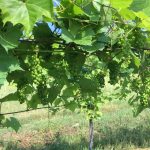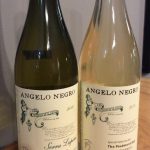It is that time of year when we surround ourselves with family and our chosen families, and celebrate that we have each other. It is a time for self-reflection, for considering what is well in our lives and for taking responsibility for things that we might change for the better in ourselves, our relationships and our communities and resolving to work for those changes in the year ahead. Resolutions represent some of our self-identified goals for the year. We’ll probably fall short, but the new year provides the clean slate for a fresh start. We can at least start off resolute.
Category: Thoughts
Marty’s thoughts on wine.
Thanks from Windham Wines
Living Local In Vermont – It’s All About Resilience
Well, it has not felt like Vermont lately, but then neither has the Pacific Northwest felt like the Northwest. Comparatively, we are lucky, and as I write, it is pouring and the temperature inside has dropped from a steamy 86 degrees to a blissful 78 degrees. We don’t tend to get long periods of unbearable heat and humidity here, but we know that it will be back. Mercifully, there is wine– especially sparkling, white and rosé.
Thoughts on Spring from Windham Wines
As the leaves unfurl and the grass greens to color our hills and mountains the hue that gives Vermont its name, we have much for which to be grateful. Summer 2021 promises to bring physical reunions with family and friends. That is cause for celebration– and we have some celebratory wines to enhance your festive mood. As always, we have been tasting and have more recommendations below, including rosés. We also have our final two virtual tastings of the winter-spring tasting season before we take our summer break.
Town Meeting Day + Sugaring + Mud Season = Spring is en route to Vermont
The snow has mostly melted, the sap is flowing and our roads are erupting or imploding. Spring is imminent. Just to underscore that eventuality, a quintet of red-winged black birds came by the feeders earlier this week. Welcome back harbingers of spring! But all of you humans who migrated somewhere south, you know better than to return during mud season.
Wines to Celebrate Black History Month
February is Black History Month. We’ve included two wines among our recommendations that are made by black winemakers. The McBride Sisters genesis includes a wild story about two half-sisters, one raised in California, the other in New Zealand, who did not know the other existed. Finally at ages 16 and 25, they met. It’s worth a listen. Mouton Noir is a winery started by André Mack, who began his career at Citicorp Investment Services, then followed his wine passion to become a sommelier, including at Thomas Keller’s French Laundry before being tapped to be head sommelier at Per Se.
2021 Winter Musings from Windham Wines
What a year 2020 was. I think we’ll be talking about it with our kids and our grandchildren for years to come. I certainly hope that it remains one of the most unusual years of our lifetime. Fortunately, our kitchens give us the opportunity to recreate the flavors of our favorite food destinations and the Windham Wines virtual tastings have taken us on satisfying group travel adventures as we visit and taste with winemakers in Italy, France, Austria, Spain and the United States. We’ve actually traveled quite a bit in this past year, and we have many more trips planned as you’ll discover in our tasting calendar.
Filtered and Non-Filtered Wine
What difference does it make to filter a wine? After grape juice undergoes fermentation, wine is often filtered both to take out the final, infinitesimally small yeast particles or bacteria that may make a wine unstable (and lead to off-putting aromas) and to enhance the wine’s luster. Some importers, however, have championed unfiltered wines (e.g., Kermit Lynch, Joe Dressner, and now many natural wine importers) because they believe that filtering extracts not just particulates, but flavor. They contend that wines made cleanly, with balance of pH and acidity, will be stable. In that case, filtering extracts compounds whose contributions to the final wine are important to that wine’s identity.
The Beauty of Wine to Connect
My friend (and a friend to many to of you, too), Peg, sent us an email thanking us for a wine that she gave as a gift, observing that, “[w]ine has the power to transport people to places, experiences, and people that are held in the heart.” In that case, a bottle of Sicilian wine propelled its recipients to a grandmother’s time and village, allowing them to celebrate her life as they remembered her from their porch in Apalachicola, FL.
Autumn Thoughts: Shop Where You Live
Everyday we are thankful to live in this state whose identity is associated with preserving both non-human nature and small communities. Just as non-human nature needs protection by humans (mostly from humans) to survive, small communities need the support of local residents to prosper. If we want to continue to celebrate Vermont’s small towns, to those volunteer efforts noted above we need to add mindfully shifting our shopping to support local merchants.










